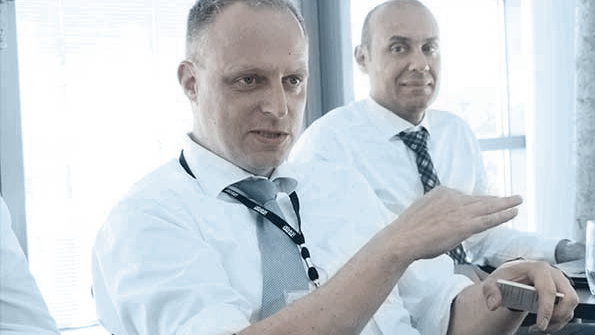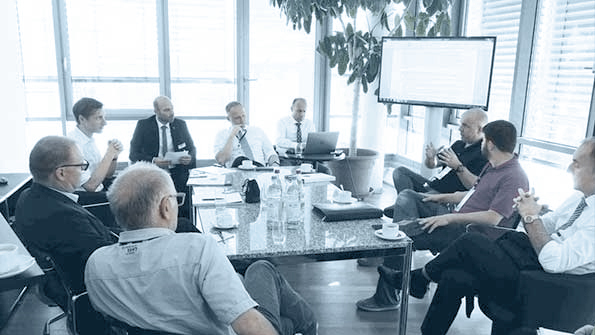Looking for tomorrow's specialists
An interview with industry experts about the shortage of qualified personnel
As part of the annual Open House, Tebis hosted a Round Table. He discussed the shortage of qualified personnel with industry experts. What requirements will tomorrow's managers have? How do you find and promote young talent? A protocol.
AUTHOR Susanne Schröder
(© Hanser/Schröder)
Qualified employees are a key factor in our continued competitiveness. However, studies show that there is currently a serious lack of qualified personnel. This is exacerbated by demographic developments.
Why are we lacking in qualified personnel in our industry?
Jens Lüdtke from Tebis AG opened the discussion with this question. Each participant was prepared for an open discussion – and to critically examine their own approach. The following reasons stand out from a business perspective:
- Lack of agility: It is difficult, in practice, to react spontaneously to changes in the business environment, and this issue has not been given the necessary priority.
- Lack of digital approach: It is not enough to simply buy software and analyze processes. All players must also "rethink the process." We have forgotten about the growing value of digitization. Other professions are further along here and are therefore more attractive.
- Regional aspects: It is difficult to recruit employees with a company like Porsche or ZF in the neighborhood.
- Increasing demands: Employees want more; the salary alone is not decisive. The work environment and conditions are becoming increasingly important.
- Industry image: The die maker's profession is no longer "sexy." Nobody wants to work standing all day at a dirty machine.
- Decreasing applicant quality: Many high-school graduates go straight to a university; fewer and fewer are applying for skilled apprenticeships.
- Education: is outdated. The professional schools in particular are not teaching the material needed by the companies that are taking on trainees.
How to make training work
Opinions on this are nearly unanimous: the professional schools are not teaching the material and knowledge needed by the companies. Therefore, companies now need qualify their own new employees. In the past, the trainees were often trained on old machines, but now modern technology must be used.
This is a balancing act for many companies, as Joachim Reiser explains: "I can't have a trainee spend eight hours in front of a €700,000 machine if the machine is not producing during that time. This is especially difficult for small companies."
Where production was previously the domain of specialists in machining, die making and grinding, now all-around talents are needed that can operate 5-axis simultaneous milling machines, and know the tools and NC parameters and can put everything together appropriately.
Anton Schweiger agrees: "This also improves the desirability of the profession. This is what attracts new, young employees. They have a simulator, and they can intervene and improve the processes. It's plug and play. Our training periods have become far shorter. After half a year, the trainees are already part of the team; I even let 17-year-olds work in automation. They have to learn to be entrusted with this."
Benjamin Reisinger comments: "That's been our experience as well. We work in rotating shifts over the weekends. The trainee even sets up the Hermle in their first year of training. After half a year, they need to be familiar with five-axis machines, CAD/CAM systems and feed rates."
There is another training-related issue that is important to the roundtable participants: Qualified and motivated trainers are needed: This is essential.
The companies must be committed in order to receive good applications for their trainee positions. High school internships, participating in introductory programs, inviting entire school classes and representation at education fairs can work wonders.
VDWF managing director Ralf Dürrwächter: "There are companies complaining that they are not receiving any good applications – but they are not doing anything about it. Others go directly to the school several times a year, hold open-house events and actively address people."
Anton Schweiger takes it a step further: "The fact is that today we are the ones applying for the employees and not the other way around." And an attractive workplace has to be part of the mix.

"Companies should not be complaining,
they should be actively engaging young people: for example, by holding events at their company site."
(© Hanser/Schröder)
What wellness factors a modern company should be offering
The feeling of well-being in a company plays a large role today; not just for trainees but for all employees. Aside from the "hardware" of machines and equipment, this also includes the furniture, the plants, the pictures, the break room and the coffee machine for the employees.
Bernhard Rindfleisch: "We have to continuously work to improve ourselves in order to remain attractive as a company. Today the interview often opens with the question of overtime compensation.
What do I need to offer? What can I promote? Many portals and evaluations have made companies much more transparent to applicants."
- Harald Seeßle: "Even small things can be useful. For example, coffee and water are free for our employees." There are plenty of ideas for strengthening loyalty to the company. The following measures were discussed:
- Work hours: attractive work hour models with flex-time, work from home and fewer overtime hours.
- Machinery: well-appointed machines in a clean production environment where it's fun to work.
- Participation: discussing, listening, and including employees in decisions.
- Work/life balance: pay attention to individual family needs, promote good social conditions.
Even though it seems contradictory at first: While today's employees demand a lot of freedom, many still need strong supervision.
Anton Schweiger: "There are employees who are truly seeking guidance. We have to learn how to support these employees in the right way. It's not enough just to be a good technician." And the managing director adds with a wink:
"It would have been a big help for me to have studied two semesters of psychology." At Schweiger, they try to keep things low-key. Where they used to say: "You are not going home until this is finished," today we try to motivate people so they suggest it themselves.Joachim Reisinger: "Before, we'd be going around with a club in our hands... Now things are different. If there's a conflict, first I cool off, then two days later I sit down with the employee when I'm no longer furious. You can achieve a lot more that way."
Authoritarian or warm fuzzies?
The opinion of all participants is unanimous here: A manager can certainly display emotions, but cannot operate as an authoritarian. It is much more important to employ leadership methods that ensure an enjoyable work environment.
To conclude the discussion, the most important factors that can help counter the shortage of qualified personnel are summarized:
- Managers need to increase personnel in human resources and its budget.
- Make management the task of managers, and conduct the necessary training courses.
- Provide more flexibility and free time for employees.
- Seek out open discussions with other companies – because it is important to exchange information and not just hold onto it.
- Offer higher salaries in medium-sized companies, and provide more non-financial services.
- Introduce knowledge management to document the expertise of the "old guard. "
Even if these ideas sound like a far-fetched wish list, it is clear to the participants in the discussion session that these topics need to be addressed. Every company should
develop a customized and detailed plan for counteracting the shortage of qualified personnel.
A network like the one offered by the VDWF is very important. Anton Schweiger: "We have to open up and look at each other’s companies so that we make as few mistakes as possible and can learn from each other and with each other – in order to make progress together. Otherwise we are going to miss out on the future."
Teilnehmer des Round-Table-Gesprächs:

Tebis is not only a provider of CAD/CAM and consulting in the industry, it is always putting time and energy into various networks and association work.
In addition to many technology and specialist lectures, this year's Tebis Open House also included management gatherings.
These meetings were moderated by Jens Lüdtke from Tebis AG.
Participants in the discussion on the shortage of qualified personnel:
- Ralf Dürrwächter: VDWF managing director
- Benjamin and Joachim Reisinger: Reisinger Modellbau GmbH
- Bernhard Rindfleisch: Tebis AG Chairman of the Board
- Anton Schweiger: Managing director of Schweiger Werkzeug- und Formenbau and vice president of the VDWF
- Harald Seeßle: Managing director of S&G Zerspanungstechnik GmbH
- Andreas Sutter

"Young people today are digitally oriented. We
need to adapt our companies accordingly."
(© Hanser/Schröder)

